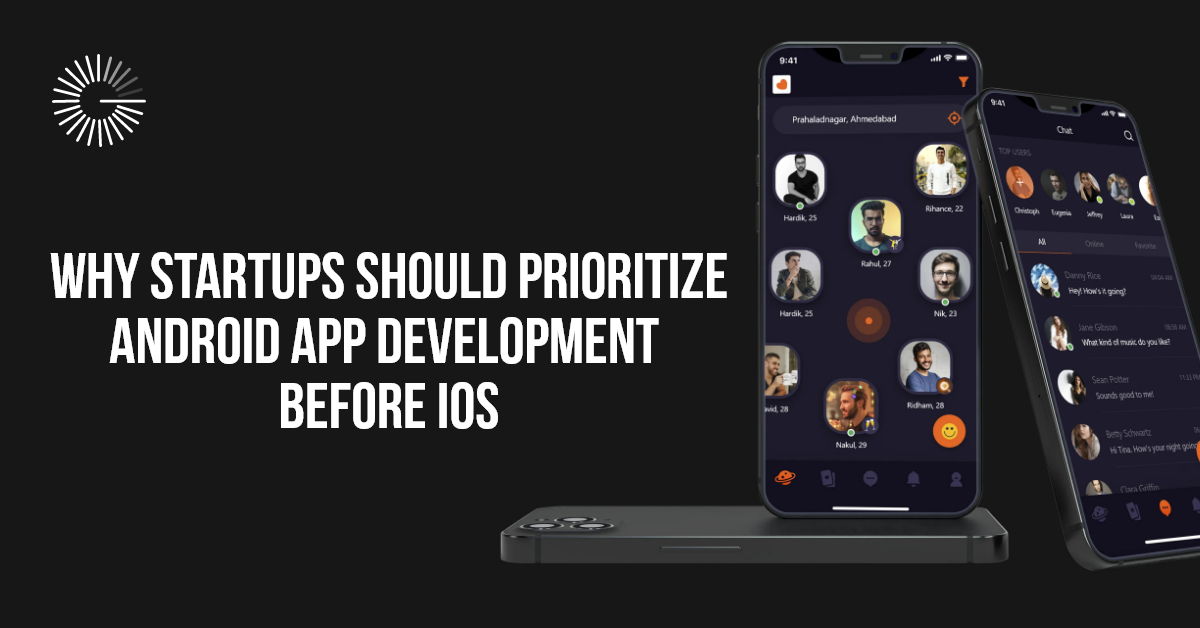The initial question that every digital product startup must answer is whether to start with Android app development or launch on iOS. On the surface, iOS is usually aesthetically pleasing- smooth design, dedicated customers and effective monetization. However, when time and funds are limited to the startups, the most intelligent thing to do is likely to focus on Android first before iOS. This move can not only determine the early adoption, but also the path of the business during its crucial initial years.
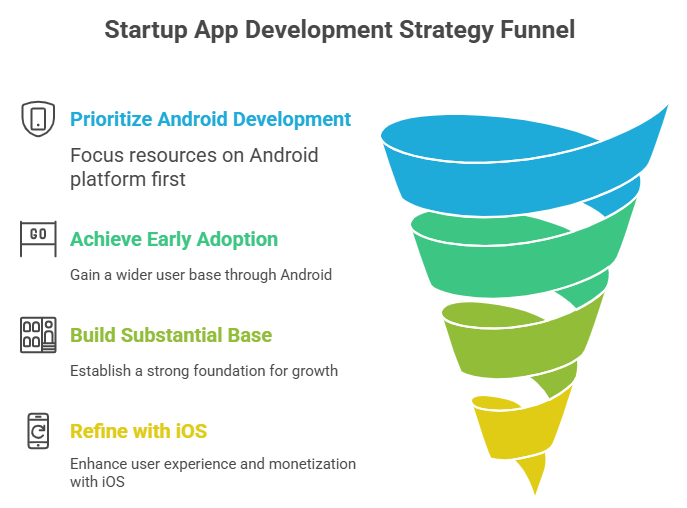
This is not a technical decision but a strategic one. Such choices can affect reach, adoption rate, and long-term growth. Knowing why Android will be more valuable in the short term will enable the founders to invest and focus resources where needed the most to make sure that their initial market actions are effective and sustainable. To a great extent, preferring Android initially is a decision to build a more substantial base of scale and then pursue the refinement.
Global Market Share: Android Dominates the Numbers
Market size is one of the most interesting reasons to begin with Android app development. Android controls approximately 70% of the mobile operating systems market worldwide as of 2024 versus approximately 28% of the market controlled by iOS. To startup companies wishing to reach as many people as possible, ostracizing Android would be to dismiss a vast market base of potential customers, and perhaps the first-mover edge in markets with rapid growth.
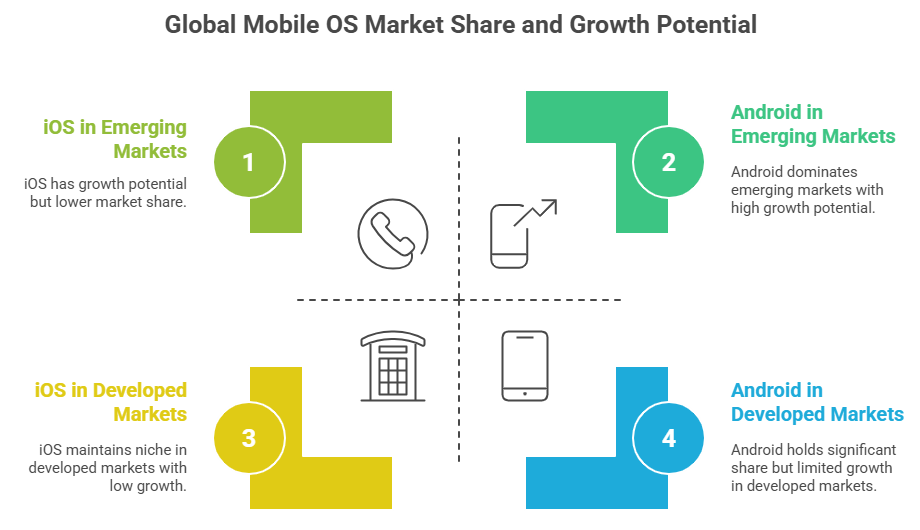
This is notably so in the case of emerging markets like India, Africa, and southeast Asia- the areas where startups tend to experience the greatest growth potential. Android provides businesses aiming to expand globally billions of users that iOS can never achieve and as a consequence providing them with an obvious advantage in creating brand presence and growing more quickly across varied demographics.
Read Our Blog:- How Crypto Launchpads Help Startups Raise Capital Faster
Cost Efficiency: Build Once, Reach Many
The creation of an mobile application can be more cost-flexible. Although it is undeniable that Android apps have to be compatible with a broader variety of devices, such recent frameworks as Flutter and React Native make cross-compatibility more accessible than ever. This implies that startups will be able to create feature-rich apps at a quicker pace without having to create a big budget on the development side. Android enables the founders to allocate resources in innovations instead of continuous compatibility remedies because it reduces technical barriers.
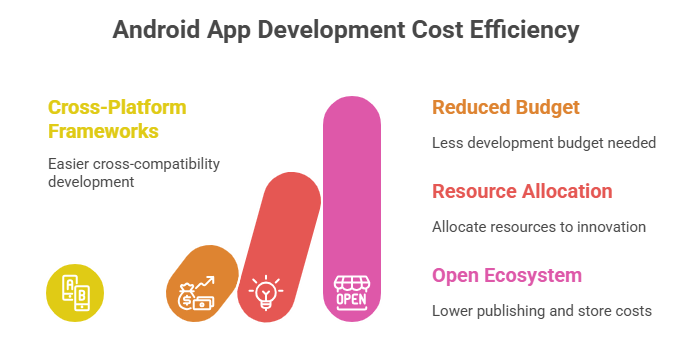
The open ecosystem means that startups with limited budgets can leverage Android, in which the cost of publishing and the cost of an app store are much less than on the App Store. This simplifies testing, iteration and updating of apps without having to strain the financial budget. The reduced barriers also help in experimentation where young firms are able to test their ideas and make their decision before making big investments.
Read Our Blog:- The Evolution of NFT Marketplaces: What Businesses Should Know
Accessibility in Emerging Markets
Startups are successful when they are able to access users fast and in large numbers. Affordability and accessibility are very important in areas where Android is dominant. Android gadgets typically cost much cheaper than iPhones and, thus, the latter is the default option of most buyers. The wide availability means that startups receive access to huge user bases immediately, which contributes to more rapid adoption.

This is low cost that is translated to user adoption. India, as one of the fastest-growing startup centres, has over 90% Android in the smartphone market. The first startup that focuses on Android reaches this group to create a better foundation to escalate. In the process, they will not only achieve early momentum but also be placed in a stronger position to win long term loyalty in markets where digital growth is taking off.
Read Our Blog:- 10 Reasons Why Your Business Needs Custom Software Development
Flexibility and Innovation: More Room to Experiment
The open-source characteristic of Android gives developers the chance to go beyond the limit. Startups enjoy more flexibility in how they design apps, features and integrations. Android does not have such a strict policy regarding approvals as iOS app development does; it allows experimenting with new ideas. This freedom enables innovators to introduce unique solutions quicker which in most cases provide them with a competitive advantage in a saturated market.

This flexibility can spell out the difference in situations where speed and agility are of essence to the startup. Also, the ability to release minimum viable products (MVPs), test features on real users, and pivot is frequently simpler in the Android ecosystem. This on-the-fly adaptability not only minimizes risk, but also allows the company to seize market opportunities before the competitors can respond.
Faster Time-to-Market with Iterative Testing
An app that is starting a new e-commerce site, such as one, may run test checkout processes with Android users in real time, where information would be gathered that would guide the launch in iOS at a later date. This is a staged method of product refinement with reduced risk. It also has the advantage of polishing the iOS release to a greater degree where the features that have proven to be workable have already been tested before by real users.
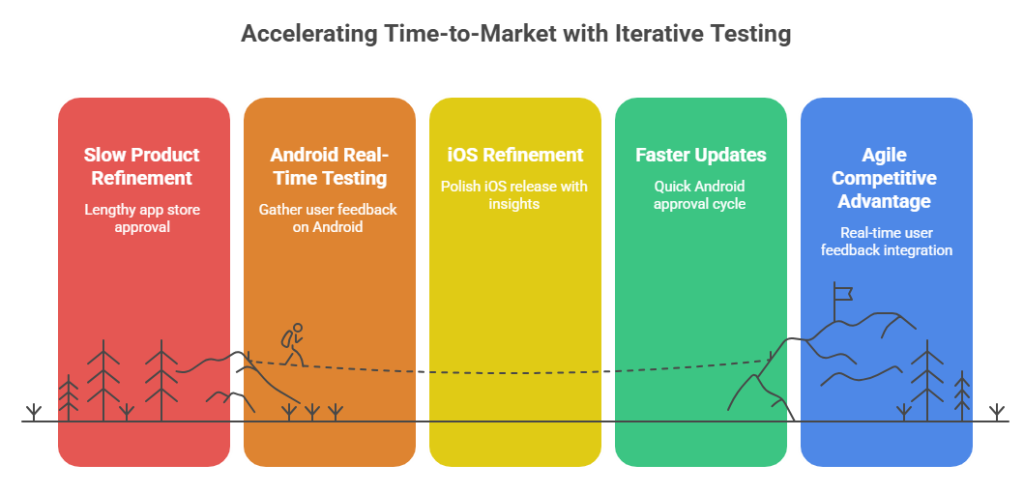
Startups win by moving fast. The quicker Android approval cycle allows start-ups to release updates and fixes faster as compared to the App Store approval cycle. This translates to less waiting and more learning. Quick dissemination of the changes contributes to the fact that the teams can act on user feedback in real time and make agility a tangible competitive advantage.
Revenue Potential: Beyond Just Purchases
Admittedly, the users of iOS have a higher history of spending on apps and in-app purchases. Nevertheless, there are additional monetization models that can be highly effective by startups and which Android provides, namely ad based apps or freemium. The pure magnitude of the Android user base can tend to result in increased ad impressions and increased revenue opportunities despite lower individual expenditure.
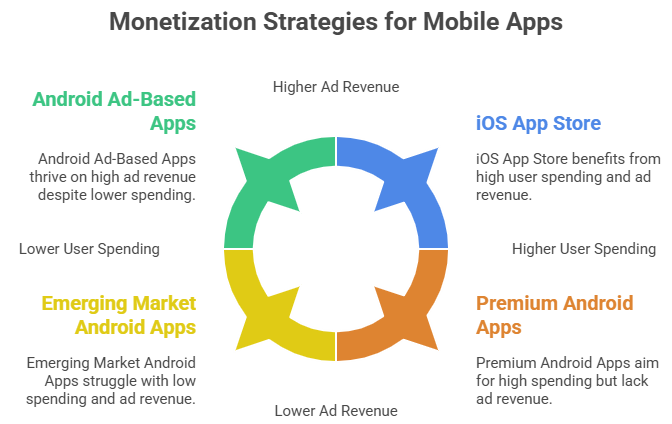
Android apps have increased ad revenue very quickly in such markets as Southeast Asia and Latin America, with Statista noting that increasing app-based ad spending has been in the double digits since 2021. In startups with large audiences, Android offers a superior channel to monetize at scale via multiple monetization approaches. This trend is not slowing down, with more people in these areas moving to cheap Android devices and spending more in-app.
Case Studies: Startups That Benefited from Android First
Many startups have demonstrated the importance of giving preference to Android app development for startups. In the example of WhatsApp, the app took off quickly in Android-dominated markets such as India and Brazil and then shifted to iOS refinement. Likewise, Android apps were the means by which fintech apps reached customers in Africa since it is ubiquitous on low-cost devices. These case studies underscore the fact that Android tends to be the catapult to global expansion and iOS polishing comes after the scale is achieved.
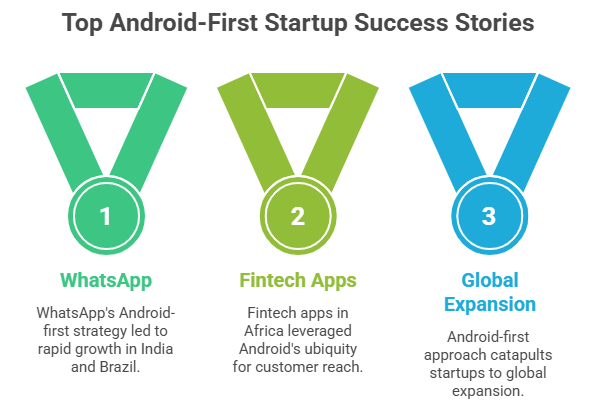
Here, one important point is that creating Android-first does not entail foregoing iOS, as it is a way of creating a scalable entry point and then extending it to a high-end consumer base. Startups can trade off speed, growth, and long-term sustainability by focusing on reach in the early and refinement in the latter stages. This incremental strategy guarantees the resources are optimized, the risks are minimized, and the momentum is maintained as the business grows to an international level.
Conclusion
When the decision concerns startups going through the precarious initial phases, the platform choice can determine the speed at which they will take off. Android is the smarter first steps as it is the most dominant in the world and has fewer barriers to entry, and its ecosystem is flexible. Prioritizing Android will help a startup reach more audiences, faster test features, and also will provide insights that can be leveraged subsequently to bolster an iOS launch.
It is not a decision on which platform is better to use indefinitely but a strategic decision on growth. The most successful companies ultimately serve both ecosystems, but a company that initially uses Android is advantaged with reach, affordability, and momentum that iOS alone cannot initially offer.
In Gyan Consulting, we assist startups in turning this strategy to reality. We can give you the skills that transform ideas into engines of growth, whether it comes to creating scalable Android applications, or making sure that a company is globally ready. Our end-to-end strategy will see to it that our applications are not only designed technically but also in the long term business strategy.

With a deep passion for technology and enterprise growth, I help organizations embrace AI development, blockchain solutions, and custom software to drive lasting transformation. As Senior Business Development Manager at Gyan Consulting, I combine strategic insight with hands-on industry knowledge, enabling businesses to scale smarter and innovate with confidence. View Profile



